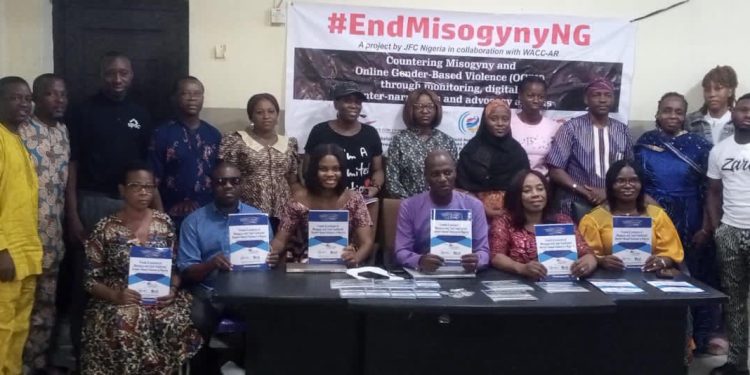A recent study has shown an alarming rate of Misogyny, Cyberbullying and Online Gender Based Violence, prompting the call for a unified response to combat this menace
The study, spearheaded by the Journalists For Christ (JFC) International Outreach in collaboration with the World Association For Christian Communication (WACC), was carried out to raise awareness and promote action against the rising tide of misogyny, both offline and online.
Mrs. Ugonma Cokey, Focal Lead of the #EndMisogynyNG Project, emphasized that violence against women extends beyond physical harm to include online attacks, such as cyberbullying and harassment.
Cokey explained that her conclusions were based on data gathered from eight Focus Group Discussions (FGDs) involving around 100 individuals, including female journalists, students from tertiary institutions, and professionals.
She noted that people living with HIV/AIDS, social media enthusiasts, and men were also part of the discussions.
According to Cokey, women are frequently targeted online, with their images and videos shared without consent.
“The data collected revealed that sex-based narratives against women are prevalent online, where women are often defamed and represented in derogatory ways.
“Women in leadership positions and women with disabilities are particularly vulnerable, often facing harassment, bullying, and unsolicited sexual advances,” she added.
Cokey recommended several solutions to combat online misogyny, including raising awareness about cyberbullying, promoting digital literacy, and encouraging men to play a key role in preventing misogyny.
She also said that creating a more inclusive and supportive online environment is crucial to protecting women from harmful behaviors.
The Project Officer of #EndMisogynyNG, Mrs Blessing Oladunjoye, shared alarming statistics from a recent study. The research, which analyzed over 500 social media posts, identified 66 instances of cyberbullying, online harassment, and misogynistic content targeting women.
She emphasized the urgent need for collective action to address the rise of online misogyny.
“Study shows that online misogyny and cyberbullying have serious consequences, such as depression, suicidal thoughts, and infantilisation.
“We need to create awareness and educate the public about the dangers of these behaviors. It’s essential to involve men and boys in the conversation, as well as engage religious leaders to promote positive change,” Oladunjoye said.
Gender advocacy expert, Funmi Falobi also highlighted the importance of awareness campaigns to tackle misogyny. “The effects of misogyny and sex-fascist interfaith violence are far-reaching. It’s crucial to sensitise the public, especially men and boys, and encourage them to actively engage in the conversation,” she said.
Falobi emphasized the role of social media in spreading awareness and combating gender-based violence as she urged responsible media reporting and collaboration with institutions to foster awareness.
“We must also encourage storytelling to educate others and promote a better understanding of misogyny. Many women abandon their ambitions due to fear and societal pressure, which perpetuates the cycle of oppression,” she remarked.
Lekan Otufodunrin, the project coordinator, called on journalists to promote peace and tenderness in their reporting, particularly on sensitive topics such as misogyny and gender-based violence.
“Journalists have a powerful role to play in shaping public opinion,” Otufodunrin stated. “I urge you to take this responsibility seriously and strive to make a positive impact through your work.”
On the question of whether the organization is considering legal action against those who are involved in misogyny, he responded saying “Misogyny is bullying, under cybercrime which is classified as criminal act, but we don’t want anybody to go to jail because of that, that is why awareness is important, let people know that what they are doing can also become criminal.
“They should be very careful and they should also remember that they are dealing with people like them and should not do anything capable of destroying their fellow human beings,” he appealed.
The #EndMisogynyNG Project, through its advocacy and visibility campaigns, aims to address the challenges of misogyny and cyberbullying in Nigeria. The initiative’s comprehensive approach, which includes monitoring, digital counter-narratives, and public advocacy, seeks to create lasting change and protect women from online violence.

